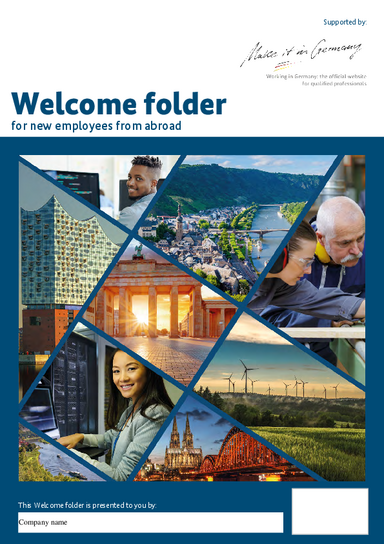
Welcome folder for employers (English)
Download the English version of the welcome folder free of charge.
Correct as of 23 October, 2024
The business community is calling for a new culture of welcome to make Germany more attractive to skilled workers from abroad. But what can companies actually do? How can they develop an integration management concept? Here you will find a guide, including a toolbox with practical examples and recommendations for action.

Successful integration within a company is a key component in ensuring the social integration and participation of skilled foreign workers in German society. Your company may be the first point of contact people have with Germany. It is therefore all the more important that it conveys a positive culture of welcome, helping your new recruits from abroad to feel a sense of belonging and satisfaction.
From an employer’s perspective, good support for the immigration and integration process can be a real advantage in the competition for the greatest talent. And good integration management is essential not only to attract skilled workers from abroad, but also to retain them in the long term. After all, only satisfied employees who feel at home will stay with the company. This is becoming increasingly important in the face of skills shortages, poaching by other companies and the phenomenon of out-migration1, where foreign workers return to their home countries after a few years.
But what form might such a concept take? Integration management can be a dedicated function within the HR department or, in the case of smaller companies, an individual can initially take on this role. They should be given the appropriate working time resources to manage these activities in addition to their core tasks.
SMEs that do not yet have an integration policy and have fewer resources for development can start by using the online services and see which of the many recommendations for action they can implement in their company. You can start small – even measures requiring little effort can be effective and send an important signal of openness and a welcoming culture. The guest articles in this issue of the newsletter also include reports from a family business and a larger company on their approaches to integration.
Above all, it is important that the issue is discussed within the company and that integration is not seen as the sole responsibility of the newcomer – nor can it be taken for granted.

It is important to recognise that the integration process for both the skilled foreign workers and the companies seeking to recruit them begins in the workers’ country of origin, not after they have moved to Germany. Preparatory measures for migration are therefore also referred to as pre-integration. This involves much more than just learning German: it is about preparing early for everyday life and work in Germany, managing expectations and the necessary bureaucratic steps. The Goethe-Institut offers professional pre-integration support with special on-site and online courses.
What companies can do in the time up to arrival: Companies should also provide as much support as possible to their new employees before they arrive in Germany by clarifying open questions and, for example, organising initial accommodation. In addition, employers can use the time before their new recruits arrive in Germany to provide intercultural training for their current employees and to prepare for the onboarding of the skilled foreign workers.
Stay in touch: As the visa process can often take some time, it is important that companies maintain regular contact with new employees during this period. This builds trust and signals to skilled workers that they are not alone if challenges arise. You should therefore also appoint a dedicated contact person in the company for the period between signing the contract and starting the job.
“Make it in Germany” provides you with a pre-designed, customisable welcome folder containing relevant and verified information to help new skilled workers make a successful start in Germany. It covers topics such as: getting started in Germany, dealing with the authorities, the health and social care system, the main types of insurance, transport and infrastructure, and living in Germany. Employers can send this folder to their new recruits in their home country to help them prepare for their arrival in Germany.
The welcome folder will be even more valuable if the employer adds company- and region-specific information – free text fields are provided for this. This information could be about the company’s organisation and day-to-day work, local transport in the region, addresses of local authorities and advice centres, or suggestions for leisure activities. The welcome folder is available as a free PDF download in English, German and Spanish.

Download the English version of the welcome folder free of charge.

These instructions explain the most important functions of the welcome folder and show you what you need to consider when completing it.
Have your new employees arrived? In the first few days and weeks, it is important to make their arrival in a new country as pleasant as possible. Meeting them at the airport or train station is a great way to show them you value and welcome them, and can help reduce any feelings of insecurity they may have.
As with all new employees, welcome days and structured onboarding are essential. It is also important to allow sufficient time for language learning as well as for bureaucratic and administrative tasks. To improve your employees’ German skills, you can offer language courses in your company or enable them to attend language courses offered by external providers. The German government supports the attendance of vocational language courses. For more information on language learning, see the “German language courses” (for companies) and “Learning German” (for skilled workers) sections.

A targeted diversity management programme can help foster a welcoming culture in your organisation.
Companies can implement this through a variety of measures. You will find some ideas below:
Further recommendations for action can be found in our toolbox and links section.
The following collection of resources will be useful to companies wishing to gain a deeper understanding of the issued addressed in this newsletter and to develop or establish an integration management system within their own organisation. The focus is on practical tools, checklists, practical examples and courses that make the subject tangible.
In the “For employers” section of our portal, under the heading “Successful integration”, we have compiled extensive tips, links and documents that may be helpful to companies.
In this webinar (in German) Anjana Singh, intercultural competence trainer and founder of New2GmbH, talks about cultural dimensions, the iceberg model and power distances, and shares her personal experiences including best practices.
The Welcome Culture & Integration Toolbox , developed by the German Competence Centre for International Skilled Workers in the Health and Nursing Professions, contains fields of action for integration management in which companies can take very specific action. The fields are explained using nursing as an example, but can also be applied to other sectors. For each topic there are explanations, practical examples, links, tips and a work aid (in the Excel spreadsheet you can enter your objectives for each field of action, the measures you want to implement and the specific to-dos).
The areas of action covered by the toolbox and the work aid are:
KOFA (German website), a centre of excellence for securing skilled labour, also provides recommendations for action and examples of measures for diversity management. Companies are guided through the process, from intercultural openness to corporate culture and leadership, to reviewing their own objectives using indicators.
This course (in German) has been designed for small and medium-sized enterprises (SMEs) and covers strategies for optimising human resources in a diversity-oriented manner and for identifying and retaining skilled workers. The course is provided by the IQ Competence Centre for Intercultural Opening and Anti-Discrimination (a component of the “Integration through Qualification” funding programme of the Federal Ministry of Labour and Social Affairs) and the Verband für Interkulturelle Arbeit VIA Bayern e.V.
The “Unternehmen Berufsanerkennung” (UBA) project provides companies with information on all aspects of the recognition of foreign qualifications and helps them with questions relating to the recruitment and employment of skilled foreign workers. The brochure (in German) “Erfolgreiche Wege des Onboardings und der Integrationsunterstützung internationaler Fachkräfte – Vom ersten Gespräch bis zum 100. Arbeitstag! ” (Successful ways of onboarding and supporting the integration of international skilled workers – from the first interview to the 100th working day) was developed on the basis of interviews.
A range of other services for businesses, such as a toolbox (guides, sample forms, etc.) and UBAconnect (getting to know international skilled workers) can be found on the UBA website .
The Charta der Vielfalt e. V. is Germany’s largest corporate initiative to promote diversity in companies and institutions. The core idea of the initiative is a certificate – the Charta der Vielfalt charter – and a voluntary commitment by the signatories to promote diversity and appreciation in corporate culture. More than 5,000 organisations have already signed the Charta der Vielfalt, representing over 15 million employees. In addition to the text of the Charter, you will find further information material and actions, such as:
The New Quality of Work Initiative (INQA) of the Federal Ministry of Labour and Social Affairs (BMAS) supports companies and organisations in the changing world of work. It offers a range of practical services to help them develop a sustainable corporate culture and secure a skilled workforce.
You can find providers of intercultural education and training on the German Education Server (available in German).
VDI, the Association of German Engineers, organises the VDI-Xpand project (as part of the IQ – Integration through Qualification funding programme; German website). The key component is a mentoring programme in which migrant engineers are supported as mentees by experienced mentors. This enables knowledge of the German labour market to be shared among professional colleagues and networks to be expanded.
[1] see Loschert/ Komitowski (2024): Auf Wiedersehen? Analyse der Daten- und Forschungslage zu Ab- und Rückwanderungsprozessen ; Boockmann / Kalweit / Kleinemeier / Knirsch / Maier / Puhe / Scheu (2022): Kontexte und Ursachen der Abwanderung ausländischer Fachkräfte aus Deutschland .
Real-life example: From Indonesia to the Black Forest – a family business reports
Real-life example: Professional integration management on equal terms
Let us advise you on your opportunities to work and live in Germany. Our experts will support you with questions regarding job search, visa, recognition and learning German.
You can find out more about the various contact options by clicking on one of the icons in the bar below.
Please switch to a modern browser (e.g. Google Chrome, Firefox or Microsoft Edge) in order to enjoy the best user experience.